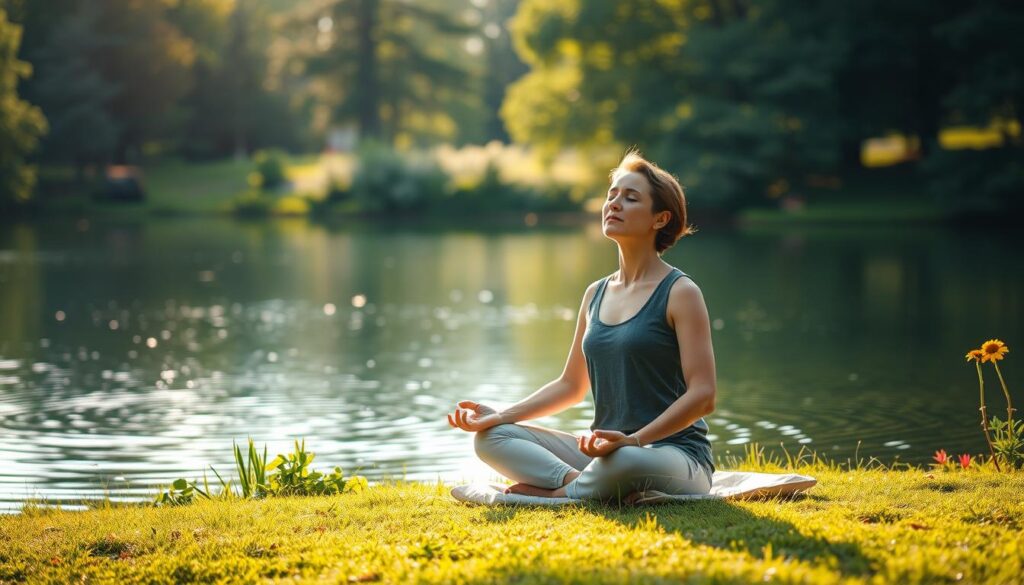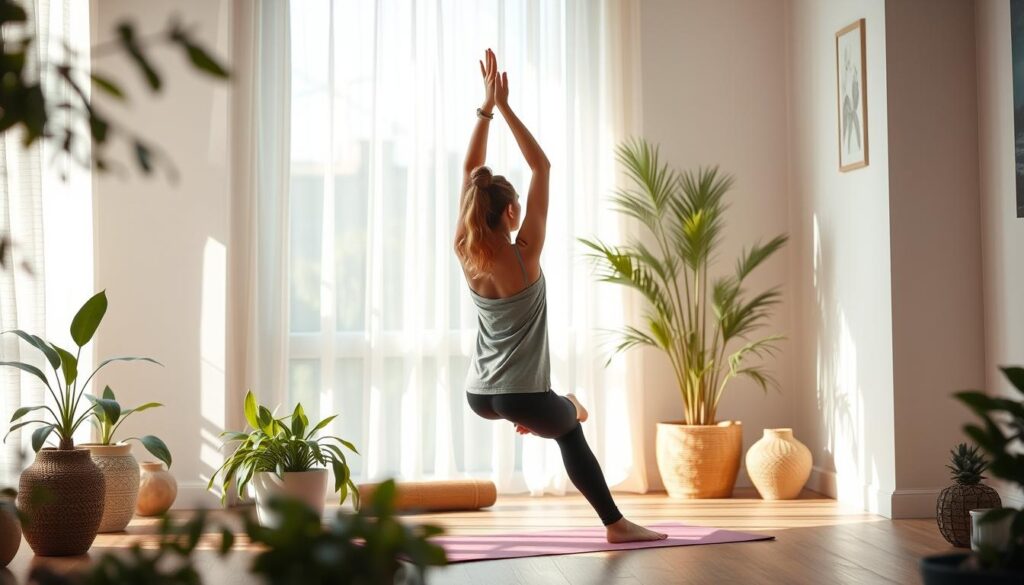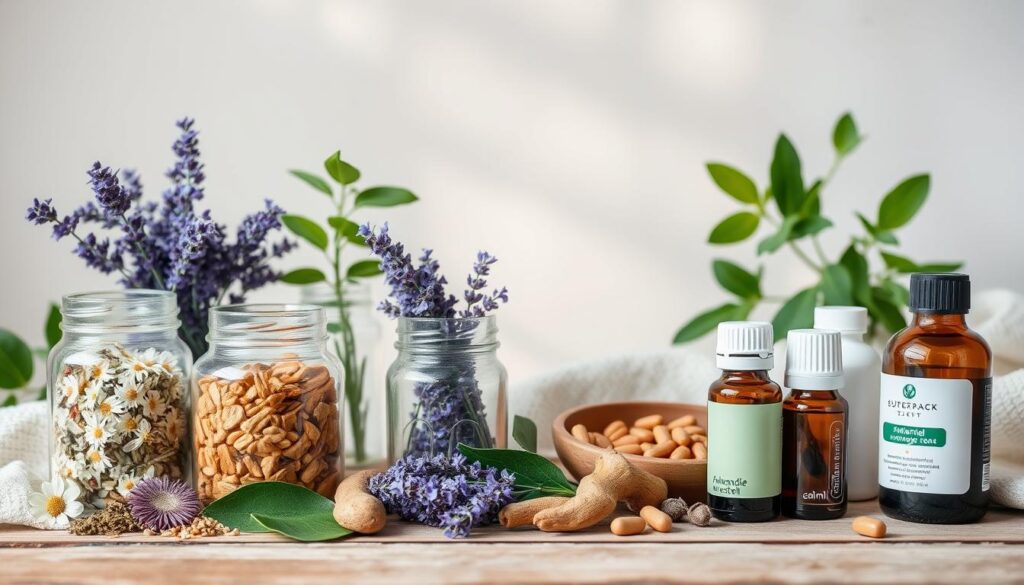In today’s fast-paced world, anxiety has become a common companion for many individuals. However, there is hope – natural remedies and holistic approaches can be powerful tools in the fight against this persistent challenge. This comprehensive guide delves into a diverse array of proven techniques that can help you achieve a lasting sense of calm and well-being, without relying on medication.
Key Takeaways
- Discover the root causes of anxiety and how it impacts daily life
- Explore effective natural approaches to anxiety relief, including lifestyle changes, mindfulness practices, and aromatherapy
- Understand the role of nutrition and supplements in promoting calmness and reducing stress
- Learn how physical activity and breath work can be powerful stress relievers
- Uncover the benefits of herbal remedies and connecting with nature for anxiety management
- Develop a personalized anxiety relief plan to achieve long-term mental well-being
- Embrace mindfulness techniques to cultivate a sense of present-moment awareness
Understanding Anxiety and Its Impact
Anxiety is a common mental health condition that affects millions of individuals worldwide. It is characterized by persistent feelings of worry, fear, and apprehension that can significantly impact daily life. Understanding the nature of anxiety and its symptoms is the first step towards managing this prevalent disorder.
What Is Anxiety?
Anxiety is a natural human response to perceived threats or stressful situations. It is the body’s way of preparing for potential danger, triggering a cascade of physiological reactions such as increased heart rate, muscle tension, and heightened senses. However, when anxiety becomes excessive, persistent, and disproportionate to the situation, it can be classified as an anxiety disorder.
Common Symptoms of Anxiety
The symptoms of anxiety can vary from person to person, but often include:
- Feelings of restlessness, nervousness, or tension
- Rapid heartbeat or palpitations
- Sweating, trembling, or muscle tension
- Difficulty concentrating or mind going “blank”
- Irritability or mood swings
- Difficulty sleeping or insomnia
- Gastrointestinal issues, such as nausea or diarrhea
How Anxiety Affects Daily Life
Unmanaged anxiety disorders can have a significant impact on an individual’s quality of life, leading to challenges in personal, professional, and social domains. Individuals with anxiety may experience difficulty concentrating at work, avoiding social situations, or engaging in everyday activities due to the persistent worry and fear that accompanies their condition. This can result in impaired relationships, decreased productivity, and an overall sense of disruption to daily routines and well-being.
“Anxiety is the dizziness of freedom.” – Søren Kierkegaard
Understanding the nature of anxiety and its common symptoms is crucial for individuals to recognize their own experiences and seek appropriate support and treatment. By addressing anxiety proactively, individuals can regain control over their lives and cultivate a healthier, more balanced state of being.
Natural Approaches to Anxiety Relief
Navigating the challenges of anxiety doesn’t always have to involve pharmaceutical interventions. Instead, there are a variety of natural approaches that can provide effective relief. From lifestyle changes to mindfulness practices and the power of aromatherapy, these holistic methods offer a gentle yet transformative path to reclaiming inner calm.
The Role of Lifestyle Changes
Making intentional adjustments to your daily routine can have a profound impact on managing anxiety. Simple steps like establishing a consistent sleep schedule, incorporating regular exercise, and mindfully managing stress levels can help alleviate the physical and emotional symptoms of anxiety. By prioritizing self-care and finding healthy outlets, individuals can build resilience and regain a sense of control over their well-being.
Mindfulness and Meditation Techniques
The practice of mindfulness meditation has emerged as a powerful tool for managing anxiety. By cultivating present-moment awareness and a non-judgmental attitude, individuals can develop the ability to observe their thoughts and emotions without becoming overwhelmed by them. Techniques such as deep breathing, body scans, and guided visualizations can help calm the mind, reduce physiological arousal, and foster a greater sense of inner peace.
Aromatherapy for Calming Effects
The use of essential oils in aromatherapy has been shown to have a soothing effect on the nervous system, potentially reducing anxiety and promoting relaxation. Certain scents, such as lavender, chamomile, and bergamot, have been found to have a calming influence on the mind and body. Incorporating these natural aromas into daily routines, whether through diffusers, topical application, or bath products, can be a simple yet effective way to manage lifestyle changes to reduce anxiety.

“Anxiety is a thin stream of fear trickling through the mind. If encouraged, it cuts a channel into which all other thoughts are drained.”
– Arthur Somers Roche
Nutrition’s Role in Healing Anxiety
When it comes to managing anxiety, the foods we consume and the supplements we take can play a significant role. By understanding the impact of nutrition on our mental well-being, we can harness the power of natural remedies to find lasting relief.
Foods That Help Reduce Anxiety
Certain foods have been shown to possess anxiety-reducing properties. For instance, foods rich in omega-3 fatty acids, such as fatty fish, walnuts, and flaxseeds, can help regulate mood and reduce inflammation in the brain. Fruits and vegetables high in antioxidants, like blueberries, spinach, and bell peppers, may also contribute to a calmer state of mind.
Supplements That Promote Calmness
- Magnesium: This essential mineral has been linked to reduced anxiety and improved sleep quality.
- Chamomile: This herb is known for its soothing effects and may help alleviate symptoms of anxiety.
- L-theanine: An amino acid found in green tea, L-theanine has been shown to promote relaxation without causing drowsiness.
The Impact of Caffeine and Alcohol
While it may be tempting to turn to caffeine or alcohol as a way to cope with anxiety, these substances can actually exacerbate the problem. Caffeine can increase feelings of jitteriness and restlessness, while alcohol, though it may provide temporary relief, can disrupt sleep patterns and contribute to increased anxiety in the long run. Moderation or avoidance of these substances is often recommended for individuals struggling with natural supplements for anxiety.
| Food/Supplement | Potential Anxiety-Reducing Benefits |
|---|---|
| Omega-3 Fatty Acids | Regulate mood and reduce inflammation in the brain |
| Magnesium | Linked to reduced anxiety and improved sleep quality |
| Chamomile | Known for its soothing effects and may help alleviate anxiety symptoms |
| L-theanine | Promotes relaxation without causing drowsiness |
By incorporating these natural supplements for anxiety into your diet and lifestyle, you can take a proactive approach to managing your mental health and finding a greater sense of calm and balance.
Physical Activity as a Stress Reliever
In the quest for natural anxiety relief, regular exercise emerges as a powerful and accessible tool. Physical activity not only strengthens the body, but it also offers a much-needed respite for the mind, effectively reducing stress and promoting a state of calm.
The Benefits of Regular Exercise
When we engage in physical activity, our bodies release endorphins, the feel-good chemicals that can instantly lift our mood and alleviate anxiety. Additionally, exercise helps to regulate the body’s stress response, lowering cortisol levels and restoring a sense of balance. Consistent physical activity has been shown to enhance cognitive function, improve sleep quality, and boost self-confidence – all of which can contribute to a more resilient and composed mindset.
Types of Exercise That Can Help
- Yoga is a particularly effective form of exercise for anxiety relief. The combination of gentle movement, breath work, and meditation helps to calm the mind and soothe the nervous system.
- Aerobic exercises, such as brisk walking, jogging, or cycling, can release pent-up energy and promote the flow of feel-good hormones.
- Strength training, like weightlifting or resistance exercises, can help manage stress by improving physical and mental resilience.
Creating a Sustainable Exercise Routine
The key to reaping the anxiety-reducing benefits of physical activity is to find an exercise routine that you genuinely enjoy and can maintain. Start small, perhaps with a daily 20-minute walk or a weekly yoga class, and gradually build up your regimen. Experiment with different activities to discover what resonates with you, and don’t be afraid to mix things up to prevent boredom. Remember, the more you can integrate physical activity into your daily life, the more pronounced the impact on your overall well-being and ability to manage anxiety.

“Exercise is not just about the physical benefits – it’s also a powerful tool for managing anxiety and promoting mental well-being.”
Harnessing the Power of Breath
When it comes to managing anxiety, one of the most powerful tools at our disposal is the breath. Deep breathing exercises have been recognized for their ability to calm the mind and body, providing a natural remedy for stress and anxiety. By tapping into the innate power of our breath, we can unlock a profound sense of tranquility and restore balance to our emotional wellbeing.
Deep Breathing Techniques
One of the most effective deep breathing techniques is diaphragmatic breathing, also known as belly breathing. This method involves taking slow, deep breaths through the nose, allowing the belly to expand as you inhale, and then slowly exhaling through the mouth. This deliberate, rhythmic breathing pattern can help activate the parasympathetic nervous system, which is responsible for the body’s rest and digest functions, counteracting the stress response.
The Benefits of Diaphragmatic Breathing
Incorporating diaphragmatic deep breathing exercises into your daily routine can provide a host of benefits for anxiety relief. These include:
- Reduced feelings of anxiety and stress
- Lower heart rate and blood pressure
- Improved oxygenation of the blood
- Enhanced feelings of calm and relaxation
- Better focus and concentration
Incorporating Breath Work into Daily Life
The key to harnessing the power of breath work is to make it a consistent part of your daily routine. Whether it’s taking a few minutes to practice diaphragmatic breathing in the morning, during your lunch break, or before bed, incorporating these deep breathing exercises can help you cultivate a sense of inner peace and resilience in the face of anxiety.

Remember, the journey to anxiety relief is not a one-size-fits-all approach. Experiment with different breathing techniques and find what works best for you. With dedication and practice, the power of breath can become a transformative tool in your arsenal for managing stress and achieving a greater sense of well-being.
The Importance of Sleep for Mental Health
Achieving quality sleep is essential for maintaining good mental health and managing anxiety. When we don’t get enough restful sleep, it can significantly impact our stress levels and increase the likelihood of panic attacks. Understanding the connection between sleep and anxiety is crucial for overcoming panic attacks naturally.
How Sleep Affects Stress Levels
Adequate sleep plays a vital role in regulating our stress response. During sleep, the body and mind have the opportunity to rest and recover, allowing our hormones and neurotransmitters to return to a balanced state. Conversely, chronic sleep deprivation can lead to elevated cortisol levels, the primary stress hormone, which can exacerbate anxiety and contribute to panic attacks.
Tips for Improving Sleep Quality
- Establish a consistent sleep schedule by going to bed and waking up at the same time, even on weekends.
- Avoid using electronic devices, such as smartphones and laptops, in the hours leading up to bedtime, as the blue light can disrupt the body’s natural sleep-wake cycle.
- Create a relaxing sleep environment by keeping the room cool, dark, and quiet, and using comfortable bedding.
- Engage in relaxation techniques, such as gentle stretching, deep breathing, or meditation, before bed to help your mind and body wind down.
Establishing a Relaxing Bedtime Routine
Developing a consistent bedtime routine can significantly improve the quality of your sleep and your overall mental well-being. Consider incorporating soothing activities, such as taking a warm bath, reading a book, or practicing light yoga, to signal to your body that it’s time to wind down and prepare for restful sleep. By prioritizing sleep and creating a relaxing environment, you can take a crucial step towards overcoming panic attacks naturally.
| Factors Affecting Sleep Quality | Impact on Anxiety and Panic Attacks |
|---|---|
| Consistent Sleep Schedule | Regulates hormones and neurotransmitters, reducing stress levels |
| Electronic Device Usage Before Bed | Blue light exposure can disrupt the body’s natural sleep-wake cycle |
| Relaxing Sleep Environment | Promotes feelings of calmness and tranquility, aiding in stress reduction |
| Relaxation Techniques Before Bed | Help the mind and body transition into a state of relaxation, reducing anxiety |
Exploring Herbal Remedies
When it comes to natural solutions for anxiety, herbal remedies have gained significant attention. These plant-based supplements offer a gentler approach to managing the symptoms of anxiety, often with fewer side effects than pharmaceutical options. Let’s dive into the world of herbal remedies and uncover their potential to alleviate anxiety.
Popular Herbs That Alleviate Anxiety
Several herbs have been recognized for their calming properties and ability to reduce anxiety. Some of the most prominent include:
- Chamomile: Known for its soothing and anti-inflammatory effects, chamomile is often used to promote relaxation and ease anxiety.
- Lavender: The aromatic compounds in lavender have been shown to have a calming effect on the mind and body, making it a popular choice for anxiety relief.
- Valerian: This herb is believed to have a mild sedative effect, which can help alleviate symptoms of anxiety and improve sleep quality.
- Lemon Balm: With its citrus-like aroma and gentle calming properties, lemon balm is often used to relieve stress and anxiousness.
How to Use Herbal Supplements Safely
When incorporating herbal remedies into an anxiety management plan, it’s crucial to use them safely and responsibly. Always consult with a healthcare professional before starting any new supplement regimen, as herbs can interact with medications or have individual reactions. Follow the dosage instructions carefully and be mindful of potential side effects.
Consulting a Professional for Guidance
While herbal remedies can be a valuable addition to an anxiety management plan, it’s important to remember that they should not replace professional medical care. If you’re struggling with persistent or severe anxiety, it’s advisable to consult with a licensed healthcare provider, such as a naturopathic doctor or mental health professional. They can help you navigate the complexities of using natural supplements and develop a comprehensive treatment plan tailored to your specific needs.

By exploring the world of herbal remedies and incorporating them safely into your lifestyle, you can take a proactive step towards managing your anxiety and promoting a sense of natural calm and well-being.
The Benefits of Connecting with Nature
Amidst the fast-paced, technology-driven world we live in, it’s easy to lose touch with the natural world. However, research has shown that reconnecting with nature can be a powerful coping strategy for those dealing with coping strategies for anxiety disorder. From reducing stress levels to promoting relaxation, the therapeutic effects of nature are undeniable.
Nature’s Role in Reducing Anxiety
Spending time in natural environments has been linked to a decrease in physiological markers of stress, such as cortisol levels and heart rate. The sights, sounds, and smells of nature have a calming effect on the mind and body, helping to alleviate symptoms of anxiety and promote a sense of peace and tranquility.
Ways to Incorporate Nature into Life
- Take a daily walk or hike in a local park or nature preserve.
- Spend time gardening or tending to houseplants.
- Sit outside and observe the natural world around you, focusing on your senses.
- Engage in outdoor hobbies like birdwatching, fishing, or camping.
Outdoor Activities That Promote Relaxation
- Yoga or meditation in a natural setting
- Gentle stretching or breathwork in a park or forest
- Picnicking or reading in a serene outdoor location
- Swimming or kayaking in a lake or river
By incorporating nature into our daily lives, we can unlock the powerful benefits it offers for coping strategies for anxiety disorder. Whether it’s a brief stroll through a local greenspace or a more immersive outdoor adventure, connecting with the natural world can be a transformative and therapeutic experience.
“In every walk with nature, one receives far more than he seeks.” – John Muir

Building a Support System
Overcoming panic attacks naturally requires a strong support system. Open communication about anxiety is crucial, as it helps loved ones understand your struggles and provide the necessary empathy and assistance. Enhancing relationships by sharing your experiences and needs can cultivate a more nurturing environment for managing anxiety.
The Importance of Talking About Anxiety
Discussing your anxiety openly with trusted friends, family members, or a support group can have a profound impact. *Sharing your feelings and concerns can relieve the sense of isolation* and provide opportunities for loved ones to offer practical solutions or simply lend a listening ear. Remember, you are not alone in your journey to overcome panic attacks naturally.
Enhancing Relationships for Better Support
- Communicate your needs and preferences to your loved ones, so they can better understand how to support you.
- Involve your support system in your anxiety management plan, seeking their input and collaboration.
- Cultivate relationships with individuals who are empathetic, non-judgmental, and willing to provide a safe space for you to express your emotions.
Finding Professional Help When Needed
While a supportive network is essential, there may be times when professional assistance is necessary to overcome panic attacks naturally. *Consulting with a therapist, counselor, or mental health specialist can provide valuable guidance and personalized strategies to manage your anxiety.* These professionals can help you develop coping mechanisms, address the root causes of your anxiety, and chart a path towards long-term wellness.

Remember, building a support system is a crucial step in your journey to overcoming panic attacks naturally. By fostering open communication, enhancing relationships, and seeking professional help when needed, you can cultivate the resources and support necessary to manage your anxiety and achieve lasting calm.
Creating a Personal Anxiety Relief Plan
Coping with anxiety disorder can be a challenging journey, but by crafting a personalized anxiety relief plan, you can take control and find lasting calm. This section will guide you through the process of setting realistic goals, monitoring your progress, and adjusting your techniques as needed.
Setting Realistic Goals
The first step in creating your anxiety relief plan is to set realistic, achievable goals. This could include reducing the frequency and intensity of anxiety episodes, improving your sleep quality, or enhancing your ability to manage stressful situations. Remember, progress takes time, so be patient and kind to yourself as you work towards your objectives.
Monitoring Progress Over Time
Regularly tracking your progress is crucial for identifying what’s working and what needs to be adjusted in your coping strategies for anxiety disorder. Consider keeping a journal, using a mood-tracking app, or sharing your journey with a trusted friend or mental health professional. Celebrate your successes, no matter how small, and use any setbacks as opportunities to refine your approach.
Adjusting Techniques as Needed
As you navigate your anxiety management journey, be open to trying new techniques and adjusting your plan as needed. What works for one person may not work for another, so don’t be afraid to experiment and find the strategies that resonate most with you. Be willing to adapt your approach, and don’t hesitate to seek additional support if you feel stuck or overwhelmed.
By creating a personalized anxiety relief plan, you can take proactive steps towards managing your anxiety and reclaiming your sense of wellbeing. Remember, your journey is unique, so be patient, stay flexible, and trust the process. With dedication and self-compassion, you can find the coping strategies for anxiety disorder that work best for you.
Embracing Mindfulness Practices
Mindfulness, the art of being present and attentive in the moment, has emerged as a powerful tool in the battle against anxiety. By cultivating a mindful state of mind, individuals can develop a greater sense of control over their thoughts, emotions, and reactions, ultimately leading to a more peaceful and balanced existence.
What Is Mindfulness?
At its core, mindfulness is the practice of consciously focusing one’s attention on the present moment, without judgment or preconceptions. It involves observing thoughts, feelings, and sensations as they arise, rather than becoming consumed by them. This non-reactive approach can help individuals navigate the ups and downs of life with greater ease and resilience.
Techniques to Cultivate Mindfulness
Numerous mindfulness techniques can be incorporated into one’s daily life to promote a sense of calm and clarity. Meditation, which involves sitting quietly and focusing on the breath, is a widely recognized approach. Mindful breathing exercises, where individuals actively pay attention to the inhalation and exhalation of breath, can also be highly effective. Additionally, practicing mindful walking, where one remains attentive to the sensations of each step, can be a grounding experience.
Incorporating Mindfulness into Daily Routines
The key to unlocking the full benefits of mindfulness is to make it a consistent and integral part of one’s daily life. Simple mindfulness practices, such as taking a few moments to pause and focus on one’s senses throughout the day, can have a profound impact. Engaging in mindful activities, like savoring a meal or appreciating the beauty of nature, can also help individuals cultivate a greater sense of presence and gratitude.